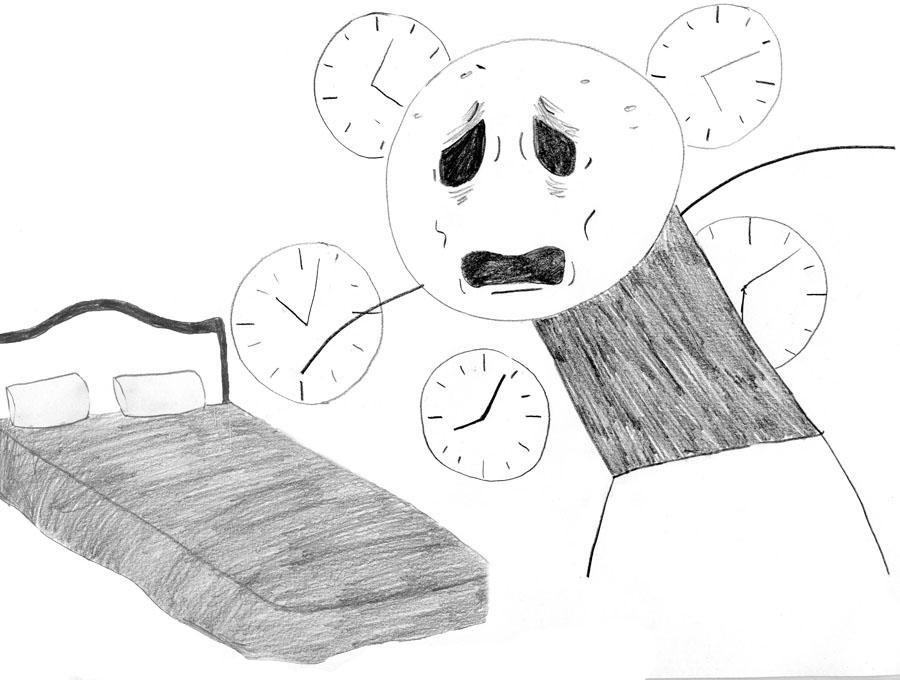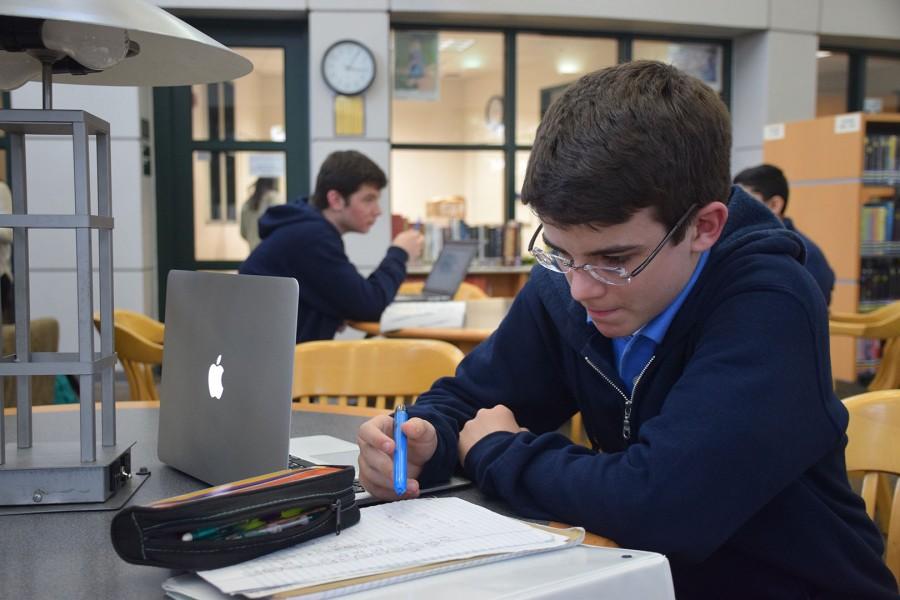Sleep deprivation is taking a major toll on Trinity students’ overall moods
“I’m so tired.” Those three little words creep around the campus on a daily basis,the reason being that we have a huge work load as private school students and, whether we admit it or not, we procrastinate like crazy. If homework loads shrunk, our campus would probably become a happier place with kids who don’t have dark circles sinking down to their knees.
The typical student goes home around 6:00 p.m. from sport practice or another extracurricular activity, opens up the computer and types in “Facebook,” “Twitter,” “Tumblr,” or “YouTube.” Then, he spends most of the night scrolling, clicking, reblogging, watching, commenting, and liking.
“YouTube, two hours” was just a basic response from Sophomore Cami Cooke about how she procrastinates.
Junior Jane Gibbons said, “I usually procrastinate with Facebook or Netflix for one to two hours.”
The student then looks at the clock and sees that he has wasted half of his night. He stays up until the wee hours of the morning trying to cram for that insane history test or that complicated math project that was assigned two weeks ago.
Once he lays his head down to sleep he only has about six hours until he has to wake up and be ready for school.
Sleep deprivation is the most common issue on campus, and many students succumb to the pattern explained above.
“Is that even a question?” said Sophomore Bailey Hamner about her sleep deprivation, meaning that sleep deprivation is a common side effect of being a Trinity student.
“Yes! I have to stay up late doing [homework] and soccer and powder-puff so I only had like five hours of sleep last night!” said Junior Alex Beemer.
Across the board students on this campus have felt sleep deprived because of the work load we have and the extracurricular activities we participate in.
When you stay up late trying to study for a test you may retain the information for a short amount of time, but it will slip your mind in the morning.
A study by Michael J Breus, PhD, proved that staying up late to study “doesn’t help your grades.” Your mind shuts down when you are tired and you end up just reading or studying gibberish. Basically, the extra hours that you are putting in to studying late at night are not helping you.
Sometimes sleep deprivation is not the product of procrastination or (a Trinity Prep phenomenon) over-studying, but the stress of school.
Stress is caused by worrying about a huge presentation that you have to do the next day. The Civics’ project or that killer Spanish oral where you have to speak for 15 minutes will do the trick.
Stress can keep you from getting a good night sleep because you are rolling around in your bed thinking about all of the things you have to do the next day.
Before you know it, you roll over and its 1:30 and you haven’t seen a wink of sleep.
According to Serendip Studio experts that specialize in sleep studies, “Sleep is needed to regenerate certain parts of the body, especially the brain, so that it may continue to function optimally. After periods of extended wakefulness or reduced sleep neurons may begin to malfunction, visibly affecting a person’s behavior.”
Sleep can affect your mood in a big way, if you are tired you do not want to hear the latest drama from your friends.
All you want is for everyone to leave you alone. You also would appreciate a big pillow and soft blanket to snooze with.
All you are thinking about is how tired you are, not about the new math formula the teacher is teaching. You are completely out of it.
Being sleep deprived does not only happen to students: it can affect teachers as well.
Teachers go home around 5:00 every day from tutoring students or grading papers and then are responsible for taking care of their families.
Students do not realize that sometimes teachers get less sleep than we do because of all of the things they must do to help us succeed.
“I am sleep-deprived because I truly need another [six] waking hours per day for family, friends, books and movies.” said English Teacher Susan Lilley. “I spend a lot of time reading, and I am a film lover, but there is never enough time! Literature and writing teachers simply must read–for knowledge in our field, for pleasure, for inspiration.” said Lilley. “Amazing new work is published daily, new films call my name, and my bucket list is miles long. Also, there are no shortcuts to grading student papers. You don’t even want to know how long that takes!”, said Mrs. Lilley; English teacher.
Teachers also are more experienced than us when it comes to planning and scheduling.
When asked what advice they would give to their students, they anwsered:”Make it a priority in your life to get a good night’s sleep,” said Math Teacher Beth Wehr. “If that means spending more time on the weekend doing homework so that you don’t need to burn the midnight oil to get schoolwork done throughout the school week, so be it.” said Wehr. “Also, if you’ve been keeping up with the day to day work in a class, a good night’s sleep will most likely benefit you more than an extra hour or two of unproductive (because you’re exhausted) study time!”
Your body needs time to rest so you can have some renewed energy for the next day.
Eight to ten hours of sleep gives your body enough time to rest and rejuvenate. If your sleeping patterns are off, you are more likely to go to sleep later and not want to wake up to go to school.
Procrastination is a major problem that affects kids’ sleeping patterns because no one wants to tackle that huge homework load. Stress of school can make it hard for kids to sleep at night, and will affect their overall mood for the next day.
Trinity needs to block out strees; things need to become slower pace so the students don’t get so lost along the way.
Sleep is a necessary tool to succeed in daily life, especially in school. Many people do not take getting enough sleep seriously. In fact, sleep deprivation can take a toll on your health. Humans are just like laptops; when we run out of juice, we need to recharge our batteries.
Finding ways to help you prevent procrastination and cool yourself down from day to day stress can be helpful.
Try making a study plan for your night. Give yourself breaks, and if you feel the urge to slip a few more seconds, minutes, or hours into your break, fight it.
The only way that you can stop this seemingly never ending cycle is by trying. If your first idea doesn’t work, take a different approach.
Have your friend change your Facebook password during the week to take away one more distraction .
Do your homework in the kitchen or dining room so you aren’t cooped up in your bedroom. These methods seem simple, but are effective.
Having a restful night will help you feel much better about yourself. You also will be able to tackle assignments easier and it will help you enjoy your day more.
Facebook isn’t going anywhere and neither is any other hypnotic social networking site. It feels much better to be done with your homework and have the whole rest of the night to watch a new episode of CSI or reblog every emotion filled post on Tumblr.
So make it a point to go home and jump right into your homework so you can have hours before you lay your head down to just go crazy on the internet.











